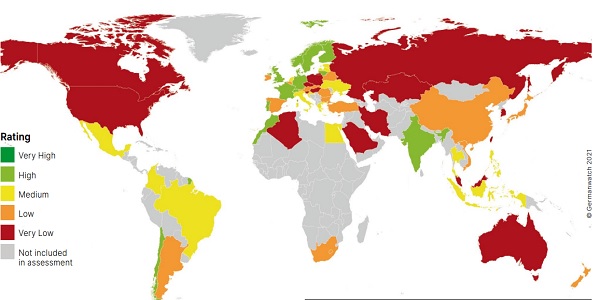 Overall results CCPI 2022;
Credit: Germanwatch 2021
Overall results CCPI 2022;
Credit: Germanwatch 2021
Luxembourg has climed three places to rank 18th out of 64 countries in the latest Climate Change Performance Index (CCPI).
Designed by the NewClimate Institute and the environmental protection organisations Germanwatch and Climate Action in 2005, the CCPI is updated on a yearly basis. The index evaluates 63 countries as well as the European Union (EU) on their performance in four different categories, namely climate policy, energy use, greenhouse gas emissions and renewable energy.
According to Luxembourg's Ministry of the Environment, Climate and Sustainable Development, no country performs well enough in the index categories to reach one of the first three positions in the ranking. The first three ranks hence remain empty, which visualises the lack of progress in climate protection activities worldwide. Even the three frontrunner countries Denmark, Sweden and Norway have, according to the CCPI 2022 ranking, not performed well enough to fulfil the commitments to keep global warming below 1.5°C or even the 2°C target pledged in the Paris Agreement.
Canada, Iran, Saudi Arabia and Kazakhstan rank last this year, mainly due to their reliance on fossil fuels which has not substantially improved in the last years.
Despite performing low in the categories of greenhouse gas emissions, energy use and renewable energy, mostly due to high demand for transportation fuels, Luxembourg ranks the highest in the climate policy category. According to the Environment Ministry, this highlights the country's willingness to address these issues in a progressive and ambitious manner. According to the CCPI methodology, the climate policy category covers the most recent development in national climate policy frameworks, which includes international climate policy commitments. The authors of the index consider that climate policy measures taken by governments, if effective, will improve the three other categories in subsequent years.
Luxembourg adopted its Climate Law in December 2020, which fixes the legal and institutional framework to achieve national, medium- and long-term climate goals. Along with having defined sectoral goals, Luxembourg committed to reducing its non-ETS (emission trading scheme) greenhouse gas emissions by 55% by 2030 compared to the 2005 level. The Climate Law also aims to achieve net zero emissions by 2050.
The CCPI 2022 is available at https://ccpi.org/.








